SAP Ariba implementation training guide
SAP Ariba Implementation
SAP Ariba is a platform that plays a significant role in making the procurement process smooth. Today, let’s have a look at several SAP Ariba implementation projects and how they impact businesses.
In the Greenfield implementation method, the company is said to be realising SAP Ariba when it has no earlier Ariba system in place.
This marks the beginning of a shift, encouraging businesses to adapt their procurement style accordingly.
Another plan, Brownfield implementation, involves replacing the old with the new by refining the existing system. Companies that are already using an ERP or legacy procurement process to migrate to SAP Ariba are not just seeking to run their business efficiently, but also to gain digital power.
One of the phases of the SAP Ariba implementation process is characterised by its top-down hierarchical nature. It is through this stage that the enterprises can carry out their digital procurement transformation smoothly. Via user acceptance testing (UAT) and cutover activities, the software is integrated into the enterprise.
While the UAT phase is in process, we document the expected and actual results to identify any inconsistencies that may have occurred.
This way, we can ensure that SAP Ariba processes align with business protocols and that users are familiar with the dock.

How SAP Ariba Implementation Begins?
When a company chooses to integrate SAP Ariba, it typically initiates a Request for Proposal (RFP) process. Businesses like Infosys, Capgemini, and Accenture are the usual ones competing to provide the best service for the implementation.
Once a supplier is chosen, the procedure is agreed upon through a Statement of Work (SOW).
All the people involved, such as the project teams and consultants, arrange a meeting called a kick-off meeting to get on the same page regarding project objectives, scope, and deadlines.
Key Phases in SAP Ariba Implementation
The trek is opened with a scoping phase where stakeholders evaluate the current procurement process and the modifications that SAP Ariba will bring to the modes of operation.
Current processes are examined to develop SAP Ariba integrations.
The aim is to ensure everything proceeds as smoothly as possible while achieving the optimal outcome.
The draft document is then delegated to the build team after it has been finalised, who, in turn, arrange SAP Ariba based on the previously agreed specifications.
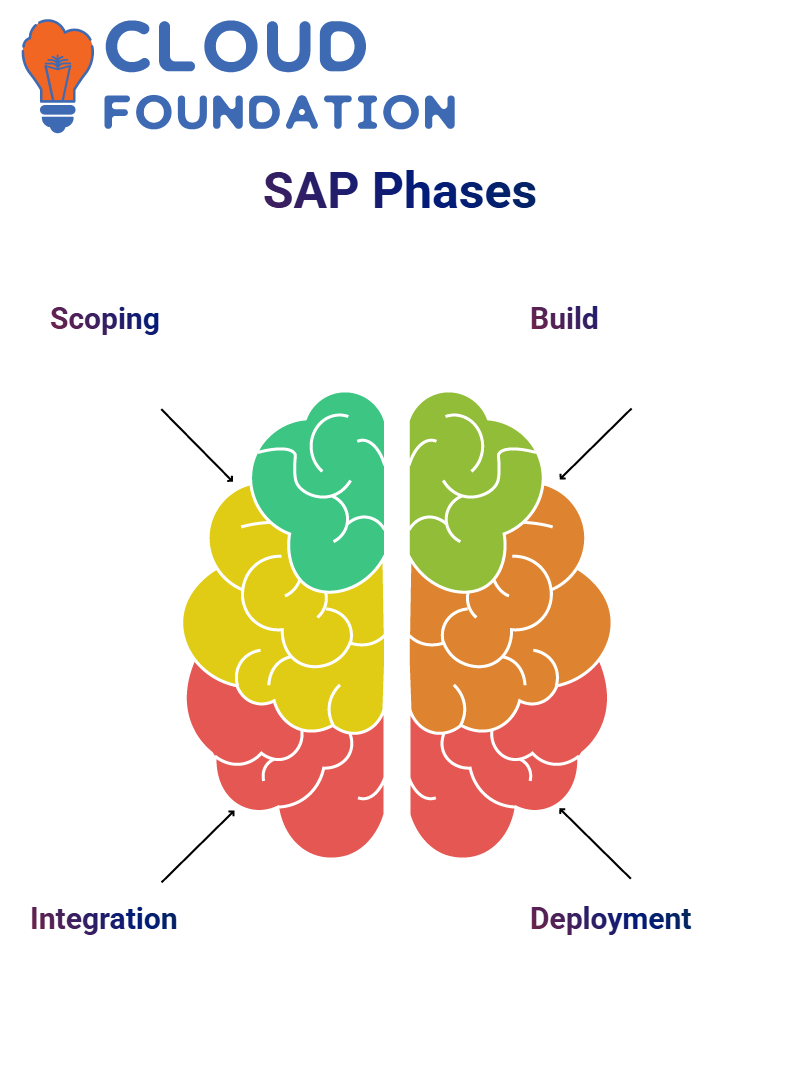
Securing Success with SAP Ariba
The integrated SAP Ariba implementation route involves experts from all three key areas of the field: consultants, business users, and technical teams.
Through a structured process of deployment, testing, and training, companies can effectively integrate SAP Ariba with their procurement process in a fast and productive manner.
SAP Ariba System Integration Testing
Upon completion of the UAT phase, system integration testing (SIT) must be conducted. This is where we confirm that SAP Ariba is synchronised and sends and receives the data that is true and truthful across systems.
Once testing for the SIT and UAT stages is completed and the go/no-go activities are initiated, a transition phase begins. This involves transferring user data into SAP Ariba and securing it for the production deployment.
SAP Ariba Integration and Sync Errors
Errors appearing during the integration performed in Ariba may lead to the discontinuity of the entire procedure.
The fact that one knows the details and a particular method of data syncing—either automatic or manual—will significantly augment the process of troubleshooting.
If there is a malfunction in the ERP system, it is necessary to verify the accuracy of payload generation and the correctness of the flow perception. Where the sync stops may be helpful in the most rational way to resolve the problem.
SAP Ariba Delegation
The act of giving up your duties to someone else in SAP Ariba is nothing but a simple yet potent function.
A user can share their rights in the system with someone else if the user is on leave.
There is no need to worry that the sequence will stop because approvals and tasks will be carried out and passed on as usual.
First, in the user manager, set a person as a delegator, and invent another delegate. That person is the one who dismisses being in the office, so they must assign their access to another person.
The system requests the delegation start and end dates, and the new user can begin working as a delegate.
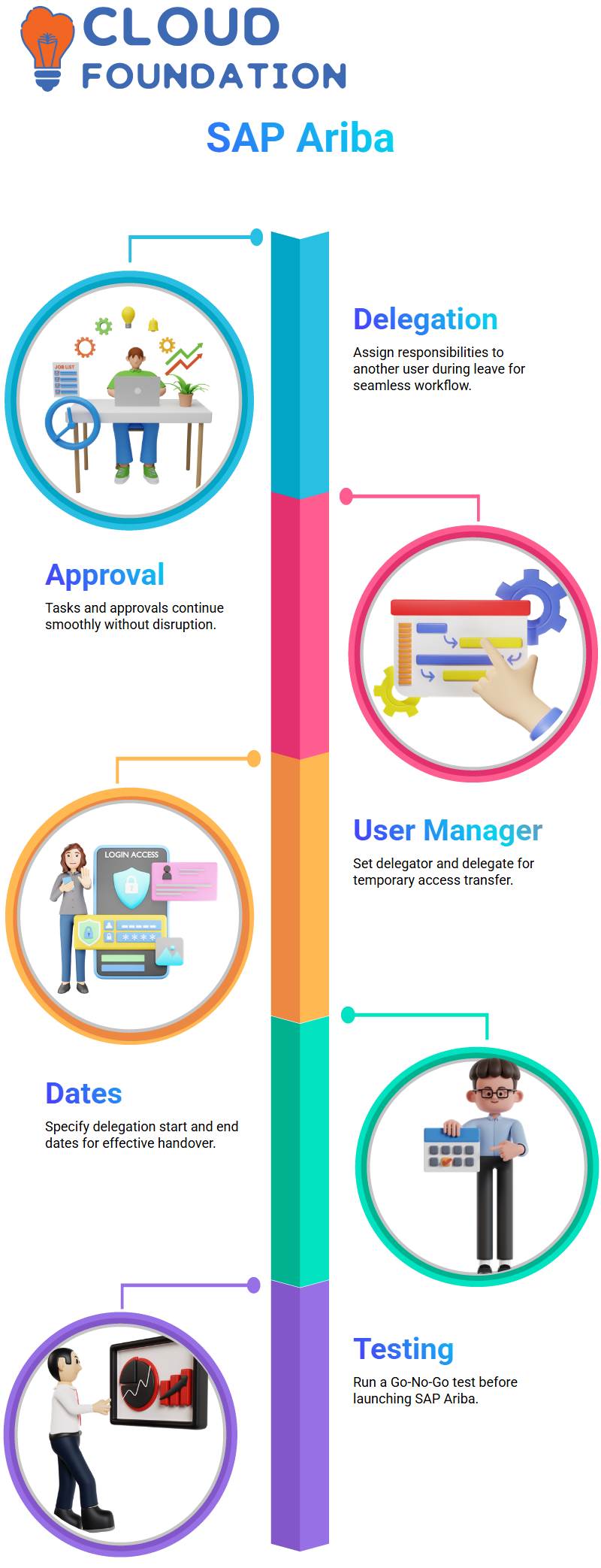
Go-No-Go Testing for SAP Ariba
Before we launch SAP Ariba, we run a test to determine if it can proceed or not.
A smoke test is used to perform an end-to-end test, which means that suppliers craft a scenario in the production environment that spans from start to finish.
Once everything is in place, the business-as-usual phase begins in SAP Ariba. End users are employing the system fearlessly, thanks to the training materials and test situations from the previous phase.
SAP Ariba End-User Issues
Being part of the SAP Ariba team involves addressing a wide range of end-user issues daily. While you are in support, it is essential to know what kinds of questions you may face and how to resolve them correctly.
You will find that the more you immerse yourself in the subject, the more problems you will address and the more questions you will answer.
For example, if the user’s problem is related to SAP Ariba access, the first step is to verify their permissions. If the problem persists, being aware of the proper delegation setup is essential.
By enabling the delegation of access to other users when they are unavailable, SAP Ariba promotes the seamless flow of documents throughout an organisation.
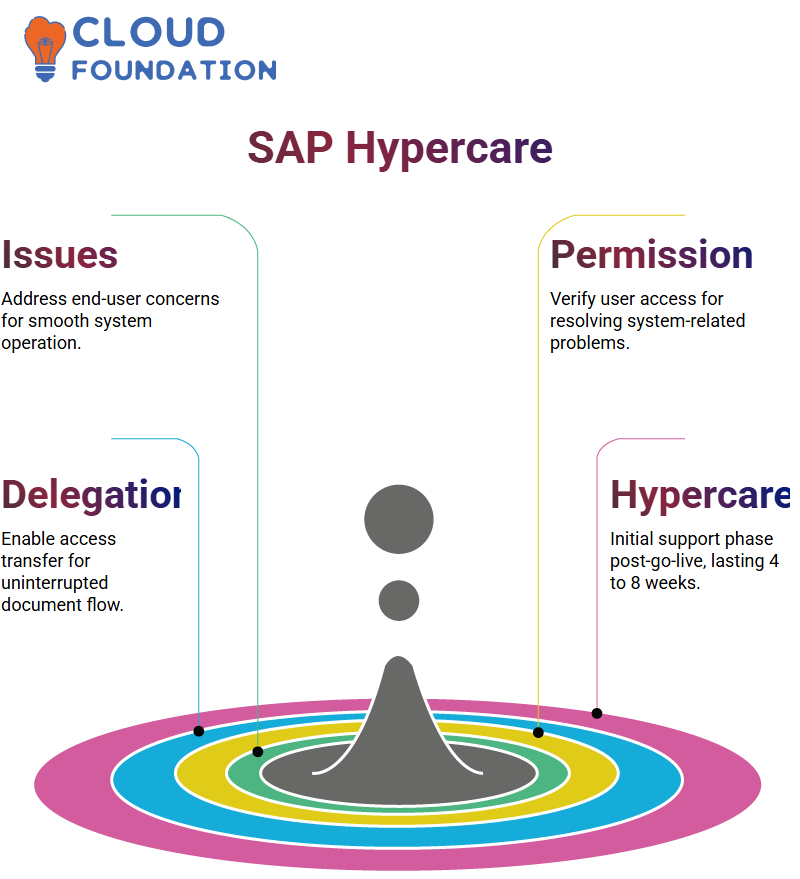
What is Hypercare and Daily Support for SAP Ariba?
Post-go-live is the period when Hypercare support is initiated, typically lasting four to eight weeks. In the meantime, the implementation team will address the issues that SAP Ariba users may encounter.
After Hypercare is over, daily support is the service that is provided. This support is offered for an extended period, confirming that SAP Ariba functions smoothly.
Depending on the project measure, the daily operations will be carried out by another team or company.
SAP Ariba Implementation Experience
Not only does emphasising your consistent involvement in SAP Ariba implementation projects bring out the real value, but it is also something that, after two or three years of experience, showing participation will significantly strengthen your resume.
Being part of the implementation team, assisting in testing, and prepping test scripts are all relevant episodes.
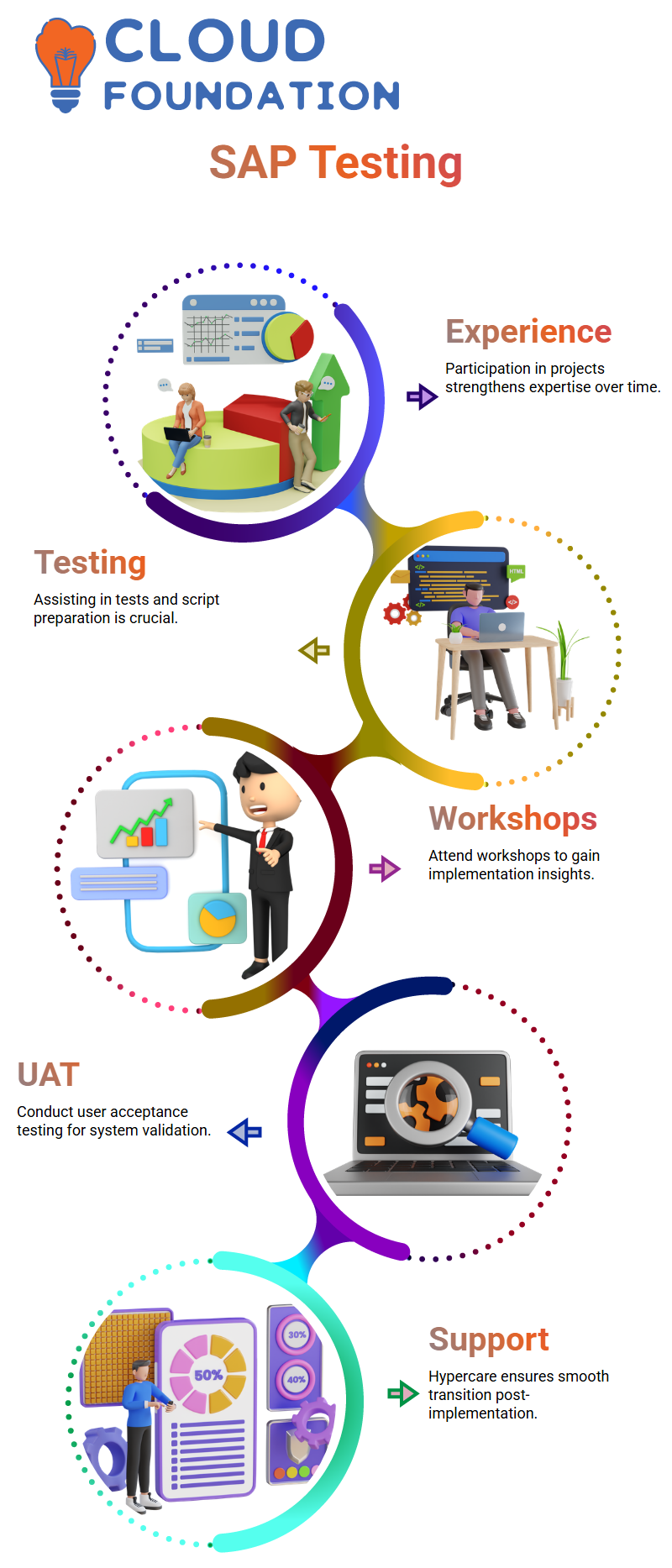
Regarding the implementation phase, the activities that need to be discussed are the attendance at workshops, creation of the scheme document, conducting user acceptance testing (UAT), and hyper-care support.
These things emerge in a live system and display the real flavour of the SAP Ariba process.
Connect with SAP Ariba
Following your training, SAP Ariba is still a component of your daily professional life. If you ever need any support, please don’t hesitate to contact me. Learning never ends, and I am always ready to help you with SAP Ariba.
Go ahead of time, get your hands dirty and work.
I find SAP Ariba very helpful; once you learn to use it, you will feel more confident in its usefulness.
Prepping for SAP Ariba Interviews
As you prepare for an SAP Ariba interview, it is vital that you are well-stocked with the knowledge to address real-life issues that you may have encountered.
Interviewers typically ask candidates about specific problems they have faced and how they have resolved them.
In case, a user was not able to include a service line item, the most important thing is to go to the template definition and find out the mistake.
Yet, in case of the template enabling line additions, the issue can be solved Also, in case the costs have been miscalculated, the formula must be checked so that the discount will be included.
Competent Questions to Ask in SAP Ariba Interviews
Asking relevant questions at the end of an SAP Ariba interview can go a long way to show interest and enthusiasm for the job.
Inquiring about the company’s SAP Ariba pathway, the difficulties encountered in implementation, or future updates is not only a good idea, but it also gives an energetic approach.
These questions are not only beneficial for advancing a positive image, but they also provide the company with a clear understanding of the SAP Ariba situation in a constructive way.
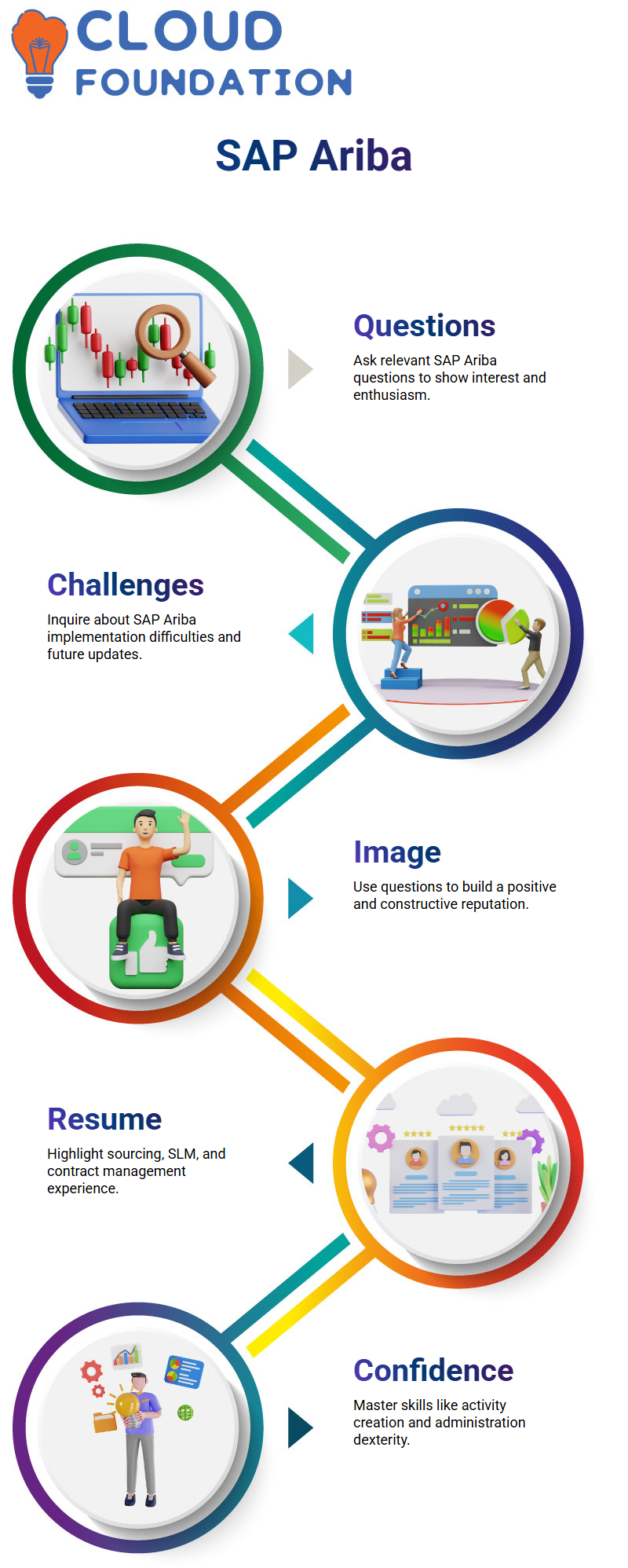
SAP Ariba Resume Dwelling
Individuals who are ambitious about working with SAP Ariba should remember that the key to success is a strong resume that highlights relevant experience in sourcing, supplier lifecycle management (SLM), and contract management.
Being confident in SAP Ariba skills is of the utmost consequence. To cultivate a progressive level of your interview performance, you should focus on counting servers’ repeat, activity creation clarity, and administration tasks dexterity.
SAP Ariba Calling Hints
One of the primary tasks of a construction project in SAP Ariba is to make informed tactical choices. If you choose the right module either upstream or downstream —you will concentrate your skills accordingly.
The key to the success of an interview is one’s preparation and clear, concise answers.
Knowledge of SAP Ariba customisations, provider matching, and key forms gives you poise and opens a new door.
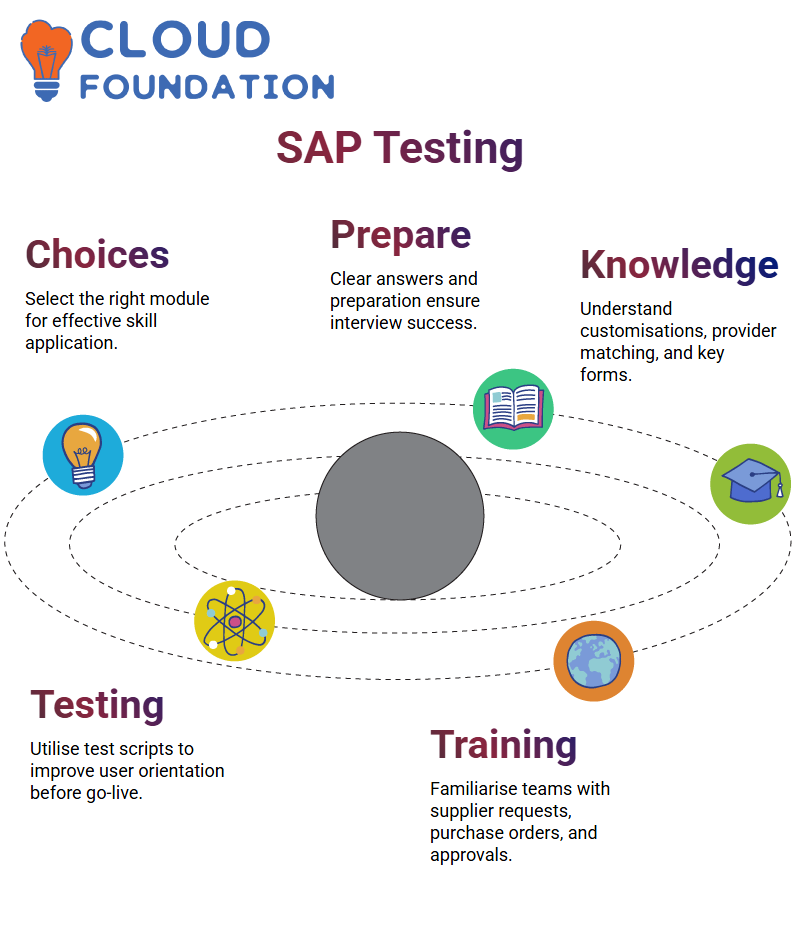
Testing and Training in SAP Ariba
Testing done by businesses before go-live utilises SAP Ariba test scripts, which help end users understand dock orientation.
Employee training sessions are essential in familiarising them with SAP Ariba, including dealing with supplier requests, purchase orders, and approvals.
Thorough documentation and a practical plan provide teams with a smooth start to their work on SAP Ariba.
Customising SAP Ariba to Meet Business Mandates
In the property phase, the target is to configure SAP Ariba templates, workflows, and approvals. Consultants will work on system modifications to confirm that they meet business requirements.
Some configurations may require SAP Ariba support. Shared services experts can assist with parameter adjustments and enable the implementation of developed features.
Practising SAP Ariba: The Key to Success
The most important point I would like to mention is practising! SAP Ariba is not a subject one can only read about in a book. It is very hands-on.
Ensure that you cover every property as well as test instances that are likely to be met in real-world applications.
Whenever you are burned out, it’s normal. I understand that things can become chaotic, especially when juggling studies and other responsibilities. But don’t give up. The more you operate SAP Ariba, the easier it will get.

Navya Chandrika
Author



